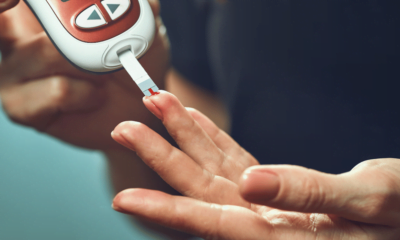Home » Health » Cannabinoid receptor agonist shows promise for autoimmune condition treatment
The study describes the success of using lenabasum – a cannabinoid receptor type 2 (CB2) agonist that triggers the resolution of inflammation – to treat amyopathic dermatomyositis.
Amyopathic dermatomyositis is a rare systemic autoimmune disease with distinctive cutaneous features. These features are frequently accompanied by muscle inflammation, interstitial lung disease and malignancy. However, amyopathic dermatomyositis presents as an active skin disease without muscle involvement.
Until the approval of intravenous immunoglobulin last year, there had been no new treatments for the condition for over 60 years.
Read more: Medical cannabis improves quality of life in autistic adults – UK study
Results from a Phase 2 clinical study have shown that lenabasum – an investigational drug under development – was a well-tolerated medication with no serious or severe side effects, offering the first oral therapeutic option specifically for the skin-only form of this autoimmune condition.
The study has been published in the Journal of Investigative Dermatology.
Amyopathic dermatomyositis
The phase 2 trial is the first double-blind, randomised, placebo-controlled research on skin-predominant dermatomyositis.
It tested the potential benefits of activating the endocannabinoid system to reduce the inflammation causing the symptoms. More than 40 per cent of the patients taking lenabasum demonstrated significant improvements.
Lead investigator on the study was Victoria P. Werth, MD, Corporal Michael J. Crescenz Department of Veterans Affairs Medical Center, US Department of Veterans Affairs; and Department of Dermatology, University of Pennsylvania Perelman School of Medicine, Philadelphia, PA, USA.
Werth commented: “Current treatments, which are limited and can involve frequent and costly intravenous infusions, are not always effective in treating its dermatological manifestations and can produce side effects.
“Our research showed that the CB2 agonist lenabasum works to improve the skin of patients with amyopathic dermatomyositis in a short period of time. The identification of a well-tolerated and effective oral medication greatly expands treatment options for patients with refractory skin disease.”
For the study, 22 adults diagnosed with dermatomyositis with moderate to severe skin disease received 20 mg daily of lenabasum or a placebo for 28 days, then 20 mg twice a day for 56 days.
On day 113, participants’ Cutaneous Dermatomyositis Disease Area and Severity Index (CDASI) levels were evaluated relative to baseline, along with secondary outcomes such as quality of life (measured with the Skindex-29) and certain biomarkers.
The results demonstrated that more than 40 per cent of the participants taking lenabasum showed a significant improvements on the CDASI.
The researchers state that the results showed a trend for the change from baseline CDASI to be greater in lenabasum versus placebo starting at day 43, two weeks after the dose was increased.
Further, at day 113 there was a statistically significant difference between the two groups.
Phase 3 study of lenabasum
A phase 3 study of lenabasum was conducted last year, but with crucial changes resulting from an FDA mandate: the participant profile shifted to include predominantly dermatomyositis patients with both muscle and skin disease, rather than skin only as in the phase 2 trial.
The study ran for a shorter period than originally planned and used outcomes that assessed lenabasum’s efficacy against inflammation in multiple organs instead of skin only. The drug was not effective for the patients with both muscle and skin manifestations.
The Phase 3 trial did, however, include a small subset of patients with skin-only dermatomyositis.
For these participants, the lenabasum demonstrated a statistically and medically significant benefit at 28 weeks, suggesting differences in the skin responses between amyopathic and classic dermatomyositis patients.
Werth stated: “In order to identify effective new therapies, patients with skin-predominant disease should be studied distinctly from those with classic dermatomyositis, using appropriate and validated outcomes to measure success.”
[activecampaign form=33]

 Science5 months ago
Science5 months ago
 Industry6 months ago
Industry6 months ago
 News5 months ago
News5 months ago
 Health5 months ago
Health5 months ago
 News6 months ago
News6 months ago
 Health3 months ago
Health3 months ago
 Science5 months ago
Science5 months ago
 Cannabis explained5 months ago
Cannabis explained5 months ago












